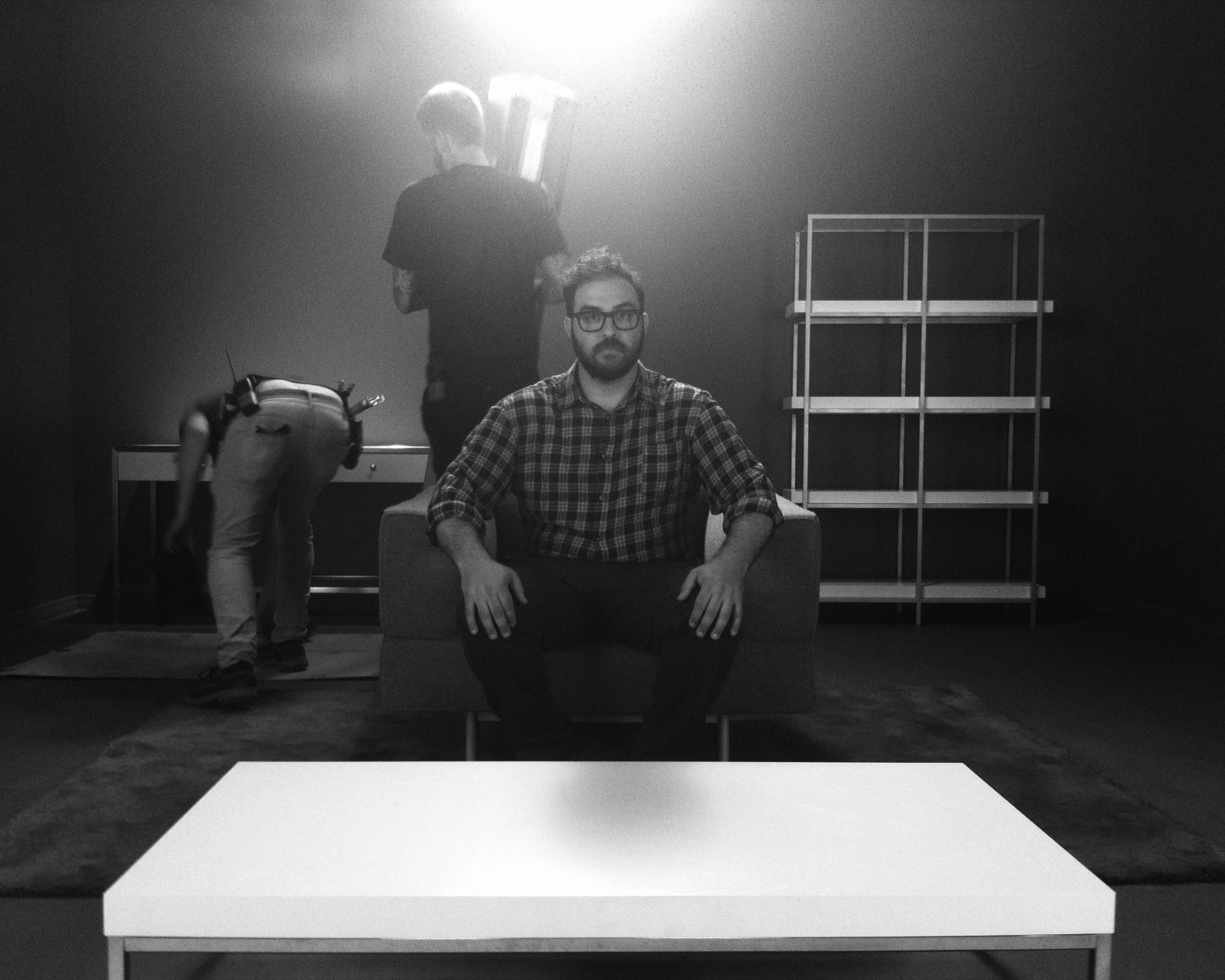
- Interview by Ryan & Tina Essmaker February 26, 2013
- Photo by Claude Zeins
Adam Lisagor
- director
- filmmaker
Trained as a filmmaker, but enamored of technology, Adam Lisagor started his company, Sandwich Video, somewhat by accident in late 2010 to address a need for compelling video in the tech industry. With the positive reception of his first video, he quickly discovered a hunger in the startup and corporate world for video that could engage as well as inform. Adam has made video for innovative companies like Square, Flipboard, Jawbone, Groupon, and Airbnb.
Interview
First off, you’ve done a few different things, so what are you calling yourself these days?
You know, it’s tax season, so I’m filing my taxes and on those forms, it says “director”. That is the most basic thing to call myself that has a lot of other job titles attached to it. I’m a director, but because I live in LA where everyone is a damn director, I say that I have a production company that makes commercial-type things mostly for the tech industry.
There are other web-type things I do. About five years ago, I would have self-identified as a blogger before I was actually making videos and before I would have the balls to call myself a director. I would certainly never call myself a filmmaker because I don’t make films. I think directing is more of a trade, which I practice quite often and feel comfortable with.
Alright, on to the first question. Describe your path to becoming a director.
Like most video people of our generation, I was fascinated with the family’s home video camera from a very early age. I was encouraged to follow that avenue and see where it took me. After high school, it made sense to study film, so I went to film school at NYU. When you start film school, you assume that you’re going to graduate and the Weinsteins will be calling to ask when you’re going to finish your script—that doesn’t happen. You have the best chance of paying your rent if you learn a skill or trade, so I learned to be an editor.
After NYU, I stayed in New York for two years and worked as a staff editor in a very junior capacity within the commercial industry. I discovered that I was fascinated with the traditional commercial advertising industry. I got to know a lot of directors in the production company I was working with and that was a good vantage point to see the huge, problematic issues of the industry; I saw what was interesting about it and also what was wrong with it.
I decided to move back to Los Angeles where, through a strange series of circumstances, I found myself working in visual effects for the movies. I learned a lot of post-production stuff that would later help inform my career as a director because it turns out that the more of that stuff you can do yourself, the better off you are. Although I was working in post-production, I was becoming increasingly interested in what was going on with technology and the web because it had enormous potential for new kinds of storytelling. I started running in the tech circles and becoming friends with a lot of developers and designers. I found a need for storytelling that existed within the tech industry and I slid right in. That’s when I started calling myself a director.
Did you have an “aha” moment when you knew that directing was what you wanted to do?
Interestingly, I had a moment when I knew it wasn’t what I wanted to do. After graduating from film school and working in post-production, I had resigned myself to not becoming a director. I had had enough experience working with directors that I felt like I didn’t have what they had, which was a certain set of charisma, ego, and mostly just confidence. I decided I had to give up my goal and instead, try to succeed in editing or something in the tech world. For a brief period, I thought I was going to go into software development. At that stage, I’d given up the hope of becoming an actual, bona fide director. How I actually became a director was backwards—it was because there was an actual need for it. There was a need to make these small video pieces and I was available to do it.
Was it the video you made for the Birdhouse app that put you on the map?
That’s right. Birdhouse was going to be the first small kernel in a large empire of software building, which didn’t turn out to be fruitful. (laughing) At the time, there was a lot of talk about how to market your app successfully and not rely on the App Store to do it for you because there were eventually going to be millions of apps out there. My partner, Cameron Hunt, and I decided that we would make a video and I was the one who knew how to do that. I made the video and that ended up being the thing that grabbed people’s attention more than the app did.
So that’s what brought you back into directing?
Exactly. It was purely accidental.
“For a brief period, I thought I was going to go into software development. At that stage, I’d given up the hope of becoming an actual, bona fide director. How I actually became a director was backwards—it was because there was an actual need for it.”
That’s crazy! So, where did you grow up and was creativity a part of your childhood?
I grew up in the suburbs in Ventura County. I feel like I was part of that “Free to Be You and Me” generation. I went to a Montessori school for preschool and creativity was celebrated, but I still had a pretty rigid early education with a lot of reinforced discipline in language arts. I think that helped to develop the part of my brain related to verbal communication early on. There was a lot of learning the rules before breaking them. In a way, I feel blessed to have been raised in a world without the Internet, where the tools we had at our disposal taught us a lot of constraint. Do you feel the same way?
Ryan: To a certain degree.
Was there digital video coming around when you were in high school?
Ryan: Yeah, later on in high school. I remember having a little camcorder. My brother and I did some editing on the computer, but it wasn’t much; it was mostly cutting and chopping pieces together.
I think every generation is going to have that rite of passage and will be able to say, “Well, when I was a kid, we only had…to work with.” Well, when I was a kid, if you wanted to edit anything, you had to connect the two VCRs together.
(all laughing)
Filmmakers who are ten years older than me are saying, “We didn’t have any damn VCR; we had to shoot on our dad’s Super 8 and splice the film.” Every generation, if they’re lucky, gets to work within the constraints they’re given by the tools that are accessible. I don’t know what the constraints are right now—it doesn’t seem like there are any.
What is it going to be like in ten years?
Ryan: I can’t imagine. Did you have one of those big RCA camcorders that you have to balance on your shoulder?
It was even worse than that. The first family VHS camcorder we owned had a separate tape deck that you wore on a shoulder strap.
Ryan: The one we had wasn’t like that; it was huge, but everything was in the one unit.
Have you had any mentors along the way?
Good question. There are filmmakers I admire, but in terms of inspiring creativity, it might just be the friends I’ve connected with online. In a certain sense, my work becomes about trying to impress my Internet friends. There’s a whole community of tech people—developers and designers—who are making the things that affect my life most deeply. Those are the people I’m really looking to for approval. People within the traditional film or advertising industry don’t care enough to notice, so I’m not going after their attention.
My job is essentially to communicate the value of technology in a way that people can understand and what’s cool is that my mentors are people who do that, but maybe in a different medium. For example, John Gruber writes so eloquently about tech and Marco Arment writes with such depth of knowledge. They’re not just using stuff and comparing specs; they’re writing in real, human terms about why something is better than something else. I aim to do the same.
This is going to sound so cheesy. Even though I never met the guy, I consider Steve Jobs a mentor—I can’t believe I just said that out loud. That’s so trite, but I’m going to go with it.
(all laughing)
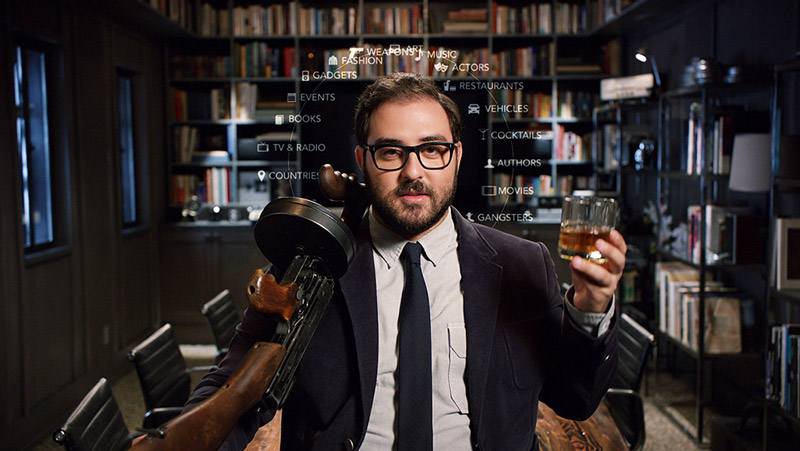
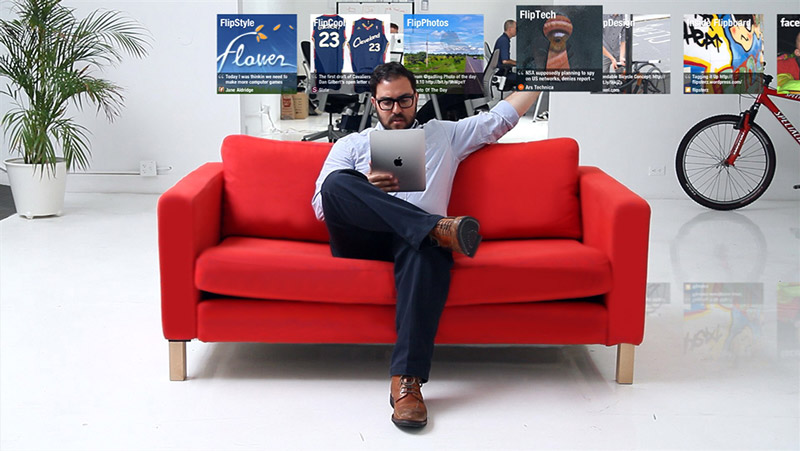
“Every generation, if they’re lucky, gets to work within the constraints they’re given by the tools that are accessible. I don’t know what the constraints are right now—it doesn’t seem like there are any.”
Was there a point in your life when you decided to take a big risk to move forward?
Yeah, I quit my job. It was after I got a few jobs doing videos, but was still earning a paycheck doing what I was trained to do as an editor. I decided that if I was ever going to do anything more substantial, then I had to only do that thing.
I had a long conversation with my dad—I guess I could consider him a mentor, too. I talked with him and he, very Godfather-like, gave me his blessing to do something stupid. My dad is a sensible man, but he’s spent his life fostering an environment for my sister and I where we could feel free to do things because we wanted to and not necessarily because we had to do them to survive. He gave me his blessing and then I felt okay about jumping in and possibly being broke for a while, which I was.
You already mentioned your dad being supportive. Are the rest of your family and friends supportive of what you do?
Very much so. I don’t think they necessarily understand what it is I do, but anybody in technology can say the same thing. It’s probably just easier to tell my family that I make commercials, even though it’s not really true. My parents get it, though; they’re fairly tech-savvy.
Do you feel a responsibility to contribute to something bigger than yourself?
Certainly. Whether or not I’m doing that is another topic entirely. I feel the worst about my work when I feel like I’m just schilling the product in order to make a chunk of cash. Yes, I feel okay about doing it because, essentially, I’m making a creative work in exchange for currency and that’s what I do and how I survive, but it doesn’t always feel like I’m contributing.
I do feel good when I’m making something that’s innovative and will potentially have an influence on how this sort of communication is done in the future. Not to toot my own horn, but I’ve seen the types of work I do show up; whether or not I was a direct influence on people to make these things, at least I was at the forefront of establishing a new format of the genre. If I’m able to be one of the first to establish a new format for communicating, it feels like I’ve had an impact. For the greater good, though, I think that people making tools are in a better position to change the world than people who are making entertainment or art, but that’s a value judgement and is completely subjective.
Are you satisfied creatively?
No, not yet. This is hard. What I’m doing right now, more than anything, is running a business—email is my full-time job. I do so much emailing every day and the more people I involve in the company, the less creating I’m doing. I’d be really interested in talking with other people in the same situation; for example, designers who have started their own shops and started hiring on other designers. I wonder if they feel like most of their job becomes management. It definitely takes away some of the creative fulfillment.
To be brutally, brutally honest, I don’t feel like I’m looking for creative fulfillment right now; what I’m looking for is to build a machine for doing these types of things. Making this production company for repeatedly generating these little artifacts with a singular purpose is the fun part for me right now. It almost feels creative. In that sense, I’m fulfilled as the company grows.
Ryan: It’s always interesting hearing responses to that question. People answer differently, but there is an overarching theme—feeling dissatisfied pulls people forward and drives them to innovate.
Absolutely. The hope is that you’re not just trying to recreate what was essential to your work when you started it. Most creative people who have garnered some attention have done so because there was something valuable to the essence of their work. Hopefully they continue to produce work with that same essence. As far as the audience is concerned, I think people are mostly going to remember when they first experienced that essence. It can be a little bit disheartening not getting the same reaction to new work and thinking, “What the hell am I supposed to do now? I only had one essence!”
(all laughing)
That’s why I think it’s incredible when an artist can reinvent him or herself; I think that’s the difference between talent and genius—when the person is essentially a machine for generating new essences.
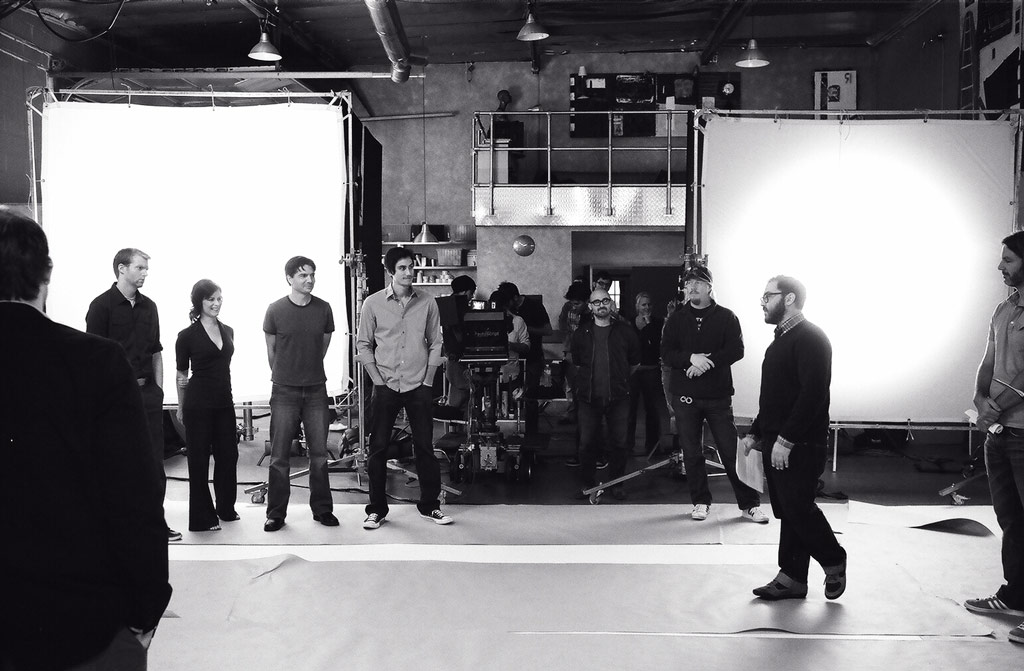
Ryan: It makes sense why you mentioned Steve Jobs earlier. He had an ability to continue to innovate and build while keeping the level of quality super high.
It’s true. When somebody has high standards, it’s because they’re obsessive about the things they’re making. What sucks about that is that obsession is painful. When you’re obsessing about things, you’re subjecting yourself to the experience of being disappointed many, many times a day. It feels like that even with these videos we make. Each one is a monumental set of disappointments and figuring out problems that need to be solved in order to make something that’s presentable and not going to potentially ruin your career. At some point, you just want to relax and have it work.
Ryan: Let me know if you figure out how to do that.
Tina: Life would be so much easier if we didn’t care or have standards, right?
That’s right! Just crank shit out.
(all laughing)
With all that in mind, is there anything you’d like to be doing in 5 to 10 years?
From time to time, I think the answer to that question would be figuring out how to use the medium to tell larger narrative stories, but when I shake that off, I realize that’s not my core competency. My competency is more education than storytelling. In 5 to 10 years, I hope the machine I’m building now is thriving and that all the parts are running smoothly; then I’ll move on and make something else.
What’s fun about our industry is that in 5 to 10 years, the world is going to look so different. I could say I want to make a feature film, but who knows what those are going to look like in the future? There might be a new medium that I didn’t know I wanted to be a part of.
Speaking of, I’m really enjoying Vine right now. Are you guys on Vine?
Yes.
I know it’s a genuine love because when I saw the first few vine.co links on my Twitter feed, I shrugged them off like, “Oh, another one. What is this bullshit?” But then, all it took was one to get me hooked. The genius in it is that you don’t have to do anything to play the videos; they just play as you scroll. It’s a great and surprisingly delightful medium that I’m enjoying right now. Vine has introduced the concept of rudimentary in-camera editing to elicit emotional response. It’s awesome because without Vine, most people are not going to shoot two clips at one time and put them together, even though there are thousands of apps in the app store that will let them do that. Going back to the kids experimenting with video cameras, that’s how most of us learned to tell stories, sequentially in order. Essentially, that’s what Vine is. People are discovering it to do all kinds of new tricks.
If you could give one piece of advice to a young person starting out, what would you say?
Confidence comes with time. It’s easy to assume that when you show up on set, you’re not going to have the confidence required to get a lot of people to pay attention to you or believe that you’re doing the right thing, but what they’re looking for most of all is an answer to the question. If you give that answer enough times with enough confidence, then they’re going to believe you and move on. It’s not as mystical as it might seem, to be a director; you just have to say what you want.
How does LA impact your creativity?
I like doing what I do in LA because, in a sense, we’re sort of outsiders since we’re not in the Bay Area, but work tangentially in the tech industry. It’s nice to be in a place where people are good at production and filmmaking, but use it to explore a different subject matter. We get to work with some of the best craftspeople. It’s fun to be around that.
How big is your team?
Roughly five people who are part of the company and then we use a lot of freelancers for each project.
Since you’re in LA, do you get a chance to collaborate with a lot of people, either professionally or for side projects?
My current workload doesn’t allow for side projects because I take on so many jobs. One of the last things I did was a video game trailer and for that project, I got to collaborate with John August, a famous screenwriter who has written a lot of big movies.
I have a filmmaker on staff with me—JP Bolles—who is the first guy I hired; he’s really talented and he and I have directed together, which was really fun. I’ve always been jealous of the brother filmmaking teams like the Coen brothers or Wachowski Starship, as they’re now called.
Are they still doing stuff?
They made Cloud Atlas recently, which was my favorite film of last year. It sort of bombed at the box office, but I thought it was an ambitious and beautiful film.
Is it important to you to be part of a creative community of people?
Yes. I would love to be able to collaborate more than I do, but the nature of this industry is to get projects done and appease the client. It doesn’t open itself up to a lot of freedom in the same way that narrative work does.
What does a typical day look like for you?
Well, I’m a late sleeper. This was a problem when I was still working at home and didn’t have an office because I would typically rise around 11am or noon (laughing) and start working around 2–3pm.
Tina to Adam: We’re like kindred spirits here. I am not a morning person at all.
For some people, that’s when their mind is doing all its best creative thinking and that’s when they’re the most restful. That’s definitely how I am.
Now, I usually get into the office around 10:30am, which is ludicrous from a business aspect, but it seems to fit the culture here. Coffee is an important part of the morning. I have phone calls with clients all day long and lots of email, which is all necessary to get the job done. Plus, there is a lot of gratification in keeping the momentum going. That’s the typical day—a lot of decision-making over and over and over again.
When we’re on set, we wake up stupid early and work a 12-hour day. You never work harder than when you’re shooting because you’re on your feet all day and your mind is in overdrive. But there’s something really, really invigorating about it; it’s like going to the gym.
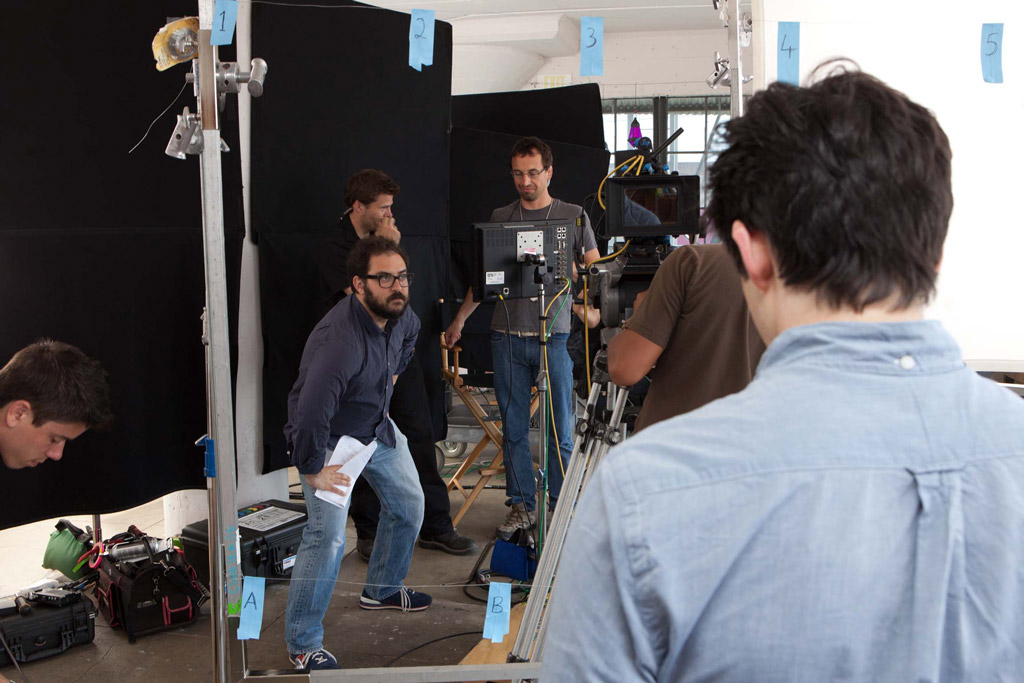
“You never work harder than when you’re shooting because you’re on your feet all day and your mind is in overdrive. But there’s something really, really invigorating about it…”
What kind of music are you listening to right now?
I’m stuck in this wave of 1980s nostalgia—not 80s pop music, but shitty 80s aesthetic, not only in musical terms, but in design terms as well. I follow a couple Tumblr blogs that are a constant roll of interesting 80s designs with laser grids, gradients, and color palettes. Normally, I listen to jazz and that’s what I’d choose if I could only listen to one genre of music, but there’s something that gets me going about 80s music. I’ve been discovering artists who create stuff in that sound with all that warpiness and the gritty synthesizer goodness. There’s an electronic musician, Com Truise, who I really love. His music gives me the feeling that I’m eight years old and have just put a VHS tape in the deck to watch an exciting, shitty action movie while I’m in my pajamas. All of that anchors to a specific time in my life and wraps around me like a warm blanket.
Do you have a favorite movie or TV show?
Yes. I’m loving TV right now. I just went through Breaking Bad all at once over a span of two weeks. Right now on Sunday nights, there’s Girls, House of Lies, and Enlightened. I also like Portlandia and Louie. I am super excited about Arrested Development coming back in a few months. They’re releasing it all at once on Netflix.
As for movies, 2012 was a great year. Argo was awesome and I already mentioned Could Atlas.
What’s your favorite book?
Infinite Jest by David Foster Wallace because it’s a book about media and its potential to transform us. I have this weird suspicion, almost paranoia, that there’s all this untapped potential for media. For nonfiction, it would be Understanding Media by Marshall McLuhan. I don’t read very much at all these days, but those are two books that have had the biggest impact on me.
Favorite food?
My office is in a section of Downtown LA called the Arts District. It’s a bohemian sort of area right on the border of Little Tokyo, so we have the best food here. There’s obviously some great ramen, but my favorite meal in Los Angeles is from a little place called the Shabu Shabu House, which is the most idiosyncratic little joint. You can’t make a reservation; you just go, get on the list, and wait for an hour. It has bright, terrible lighting inside and you sit at the counter and get served a plate of thinly sliced raw beef, rice, vegetables, and ponzu sauce. There’s a pot of boiling water and you cook the beef on your own—in Japanese, shabu-shabu translates to “swish swish”. Just telling you about it makes me hungry.
It does sound good. Alright, one last question. What kind of legacy do you hope to leave?
I hope people remember me for not taking for granted that things are done a certain way. Also, for having innovated and discovered new ways of communicating something essential without all the bullshit. So much of what’s communicated to us through any medium now is just laden with bullshit. You can’t do that anymore because people are getting good at detecting it. That’s what I want my legacy to be—figuring out how to remove all the bullshit and communicating the essence. And I want to be remembered for being nice.